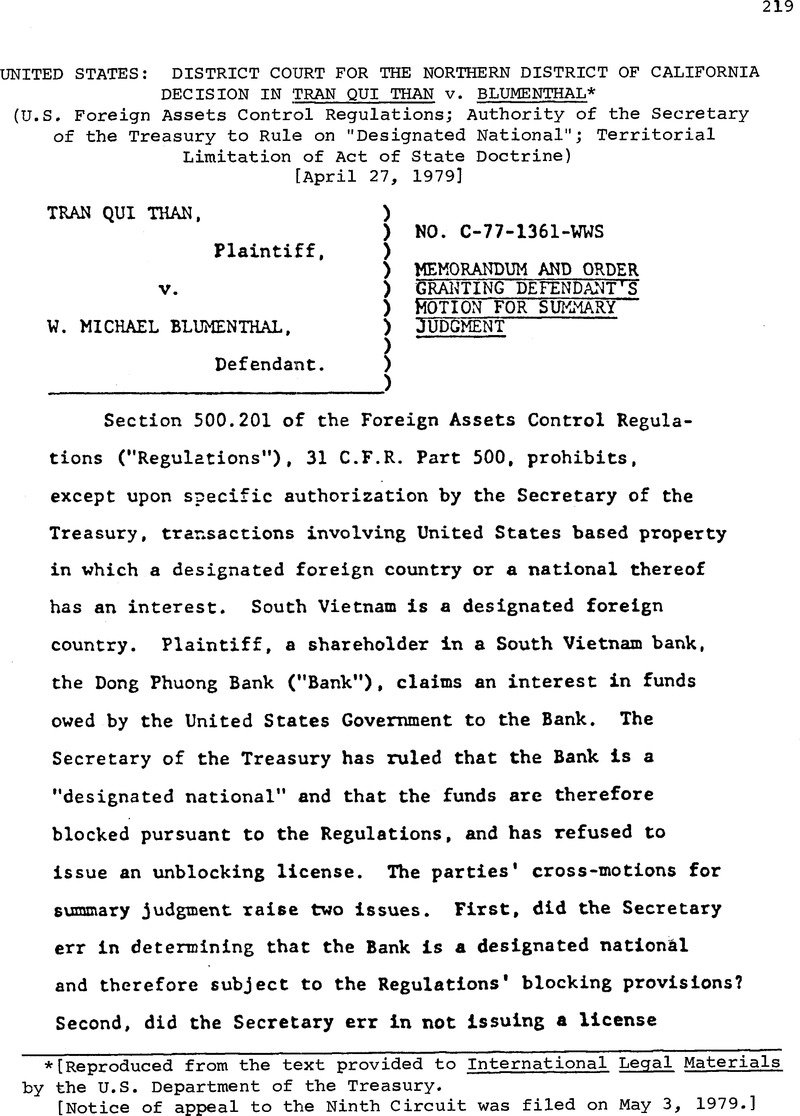No CrossRef data available.
Article contents
United States: District Court for the Northern District of California Decision in Tran Qui Than v. Blumenthal (U.S. Foreign Assets Control Regulations; Authority of the Secretary of the Treasury to Rule on “Designated National”; Territorial Limitation of Act of State Doctrine)*
Published online by Cambridge University Press: 04 April 2017
Abstract

- Type
- Judicial and Similar Proceedings
- Information
- Copyright
- Copyright © American Society of International Law 1980
Footnotes
[Reproduced from the text provided to International Legal Materials by the U.S. Department of the Treasury.
[Notice of appeal to the Ninth Circuit was filed on May 3, 1979.]
References
1/ Although plaintiff has not fully articulated it, the logical extension to his argument is that application of the Regulations to the assets of a corporation expropriated before the effective date is improper for it is not within the scope of the authorizing statute, Section 5(b) of the Trading With the Enemy Act, supra. But that Act grants broad powers to the President. Regulations issued pursuant to the Act are valid if they carry out a purpose of the authorizing statute. Ruiz v. Morton, 462 F.2d 818, 822, aff'd.. 415 U.S. 199 (1974). The purposes articulated for blocking under the Act include (1) keeping hard currency away from certain countries, Veterans & Reservists for Peace in Vietnam v. Regional Commissioner, 459 F.2d 676 (3d Cir. 1972) and (2) preserving assets for future claims satisfaction, Nielsen v. Secretary of the Treasury, supra, 424 F.2d 833. See Sommerfield, "Treasury Regulations Affecting Trade With the Sino-Soviet Bloc and Cuba, 19 The Business Lawyer. 861 (1964). While the Secretary does not contend that Tran might turn the blocked assets over to Vietnam, he does contend that blocking advances the purpose of the statute by preserving assets in which Vietnam may assert an interest for future claims satisfaction.
2/ The Secretary's action respecting assets of Cuban corporations primarily owned by American citizens was taken in response to Congressional direction:
[T]he Comittee on Foreign Relations recomnends that upon application the Department of the Treasury examine with particular care each case involving Cuban assets beneficially owned by American citizens to determine whether those assets should continue to be blocked. In the committee's view, if the assets are wholly, or substantially owned by citizens and residents of United States they should be unblocked, since it is possible that such assets may be placed in a fund at sone future date and used to pay the claims of American citizens against the Cuban Government. This would be tantamount to using the property of one U.S. citizen to pay the claim of another U.S. citizen.
Senate Report 701, 1965 U.S. Code Cong. & Ad. News 3581. 3585.
3/ Those shareholders who do reside in the United States, including plaintiff, have been paroled into the United States under 8 U.S.C. $ 1182(d)(5). In other contexts, courts have held that since a parole alien has not been “admitted” into the United States, he stands in the same shoes as an alien resident outside the United States. Yuen Sanghow v. Attorney General of the United States. 479 F.2d 820 (9th Cir. 1973). Siu Funp,huk v. Rosenberg F.2d 555 (9th Cir. 1969).
4/ ALI Restatement 2d, Foreign Relations Law of the United States § 159 (1965) states:
§ 159. Disappearance of State
If a state that is a party to an international agreement ceases to exist as a state, the agreement is terminated as to it, but the state into which it is incorporated or the states into which it is divided succeed to its rights and obligations under the agreement to the extent that
(a) the agreement defines the boundaries of the territory of the former state, or
(b) the agreement relates to the use of the territory or its natural resources.
Illustration 1 to § 159:
State A and B enter into an international agreement regulating customs duties on their trade with each other. Subsequently B is annexed by state C. The annexation terminates the agreement between A and B.




